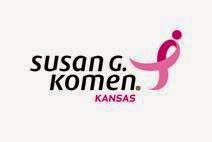When the roadblock to screening is a combination of economic
barriers, problems with transportation, access-related factors, cultural
barriers, lack of knowledge and awareness of breast cancer, and
misunderstanding of recommended screening frequency, Susan G. Komen Kansas grantees
step forward to knock these barriers down.
We visited with Marcela Cousins, Clinical Community Coordinator with the
Kansas Department of Health and Environment (KDHE) about an exciting new
program launching this October.
Life is HOT (Healthy
Options Today) is a new initiative through Early Detection Works for beauty
salons in Wichita to educate African American women about the importance of
breast health and screenings and to encourage regular mammograms with
incentives. The idea was born when
Marcela Cousens was asked the question “what do you do when you are sitting in
the chair at a salon?”
“When I said read a magazine,” Cousens said, “she then asked me what if there were messages on the cape written upside down?”
Kicking off this month, Life is HOT
will work with local beauty professionals to incorporate the Life is HOT
cape (with health messages) and window/mirror decals to encourage conversation
about a healthy lifestyle and motivate
clients to get mammograms by offering a $10 coupon for a return salon visit for
those who do.


“We are excited about the kick-off luncheon.” Cousins said. “We are starting small with 20-30 salons in the
Breast cancer is the most common cancer among Kansas Kansas Kansas


No comments:
Post a Comment